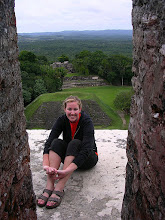The rains have not yet come. People are worried, and the farming seasons grows shorter and more uncertain every day. The riverbeds are dry and dust blows in the fields. The yam mounds that were made months ago sit barren in the hot sun. Every day people pray for rain.
Unlike Canada, Ghana has only two seasons - dry season and rainy season.
The rainy season usually begins in Jirapa in early May, sometimes even in April, and lasts through to about October. The temperatures during this season hover around 30-35 degrees C. The rains are sporadic, but when they fall they fall hard. This is the farming season, when people will grow yams, cassava, maize and other large crops. They will begin preparing the fields in April, ploughing and readying their fields for planting. When the rains come the fields are ready for planting, weeding and, many months later, harvesting.
The dry season lasts from about November to March. During this season temperatures can soar over 40 degress C. There are few rainfalls - this year there were only two in the span of four months. The fields lie dry and hot and there is no farming. Some people engage in dry-season gardening to supplement their diets (and, if they're good, their incomes). These crops include tomatoes, onions and a variety of leafy greens. But in general, life is hot hot hot and dry dry dry!
It is now the first week of June, and the rains have still not come. They are a month late and still people are waiting. There have been three rainfalls during the month of May, two since I arrived, but they haven't been close enough together to sufficiently say the rainy season has started. Once the rains come more often than every three days, then people will know that the rain is here to stay.
People are scared that there will be a repeat of last year's weather. The rains were late then too, coming at the end of May. But when they came they were accompanied by terrifying storms, high winds and torrents of rain. There were floods throughout the northern regions and many farmers' fields were just washed away. The crop yields from last year's rainy season were incredibly low. People desperately need a good year from their farms, which makes this year's late rains all the more worrisome.
Unfortunately, some of the ambitious farmers who planted early have lost all of their seeds. The very rural families who still draw water from rivers or streams are having an incredibly difficult time finding sources of water. Here in Jirapa the water comes from boreholes, which are still functioning, so we are lucky. Driving through the countryside on a motorbike, I see dry fields in all directions with no sign of life.
And there is nothing to do but wait and pray.
Subscribe to:
Post Comments (Atom)


No comments:
Post a Comment